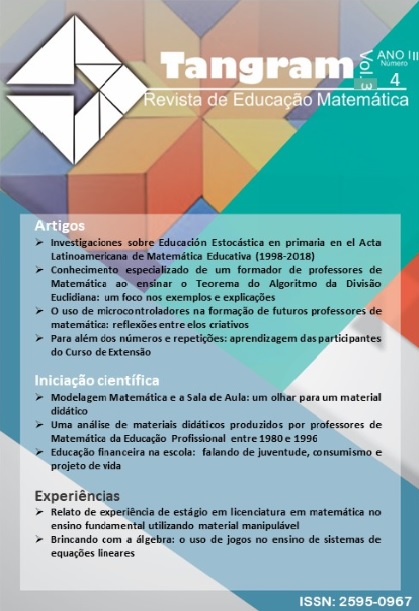Beyond numbers and repetitions: learning from participants in the Extension Course
DOI:
https://doi.org/10.30612/tangram.v3i4.11079Keywords:
Extension Course. Additive situation. Problematization. Didactics.Abstract
The article analyzes the narratives of the participants of the Extension Course (CE), seeking to identify what they point out of their learning process. It is a qualitative research, inserted in the research-training studies for using the narrative methodology in the production of data, which has as corpus of analysis the narrative texts of sixteen students of the CE of a Public University of Rio de Janeiro. Referenced in the studies by Freire (1978, 1980, 2002, 2006), Ball et al (2012) and Passegi and Souza (2017), the research showed, through the narratives of the EB participants, that they appropriated a teaching proposal in a problematic perspective, through which there is a horizontal relationship between teacher and student; the teacher mediates and organizes teaching; and, the student is considered a thinking being, who builds his autonomy, therefore, it is necessary that the teacher organize his class favoring decision making, building rules and personal strategies.Downloads
References
Ball, Stephen J.(2002). Reformar escolas/reformar professores e os terrores da performatividade. Revista Portuguesa de Educação, ano/vol. 15, número 002, Universidade do Minho Braga, Portugal pp. 3-23.
Ball, Stephen J., Magure, Meg & Braun, Anette. (2012). How schools do policy:policy enactments in secondary schools. Oxon: Routledge.
Brasil. (2020). Ministério da Educação. RESOLUÇÃO Nº 2, DE 20 DE DEZEMBRO DE 2019. Define as Diretrizes Curriculares Nacionais para a Formação Inicial de Professores para a Educação Básica e institui a Base Nacional Comum para a Formação Inicial de Professores da Educação Básica (BNC-Formação). Disponível em: http://portal.mec.gov.br/docman/setembro-2019/124721-texto-referencia-formacao-de-professores/file . Acesso em: 02 fev.
Freire, Paulo.(1980). Conscientização: teoria e prática da liberdade uma introdução ao pensamento de Paulo Freire. 3ª ed. São Paulo: Moraes.
Freire, Paulo. (2002) Extensão ou comunicação? 12ª ed. Rio de Janeiro: Paz e Terra.
Freire, Paulo. (1978). Pedagogia do Oprimido. 5ª ed. Rio de Janeiro: Paz e Terra.
Freire, Paulo.(2006). Pedagogia da esperança: um reencontro com a Pedagogia do oprimido. Notas: Ana Maria Araújo Freire. 13 ed. Rio de Janeiro: Paz e Terra.
Hoffman, Jussara (2004). Avaliar para promover: setas do caminho. 5ª ed. Porto Alegre: Editora Mediação.
Kamii, Constance. (2002). Crianças pequenas reinventam a aritmética: implicações da teoria de Piaget. 2ª ed. Porto Alegre: Artmed.
Kamii, Constance. (2002). O princípio do Ensino com Jogos. In: Kamii, Constance. Crianças pequenas reinventam a aritmética: implicações da teoria de Piaget. 2ª ed. Porto Alegre: Artmed.
Leite, V. F. A, & Abreu, L. S. (2017). O inédito-viável na democratização da escola em tempos de privação de direitos. Revista e-Curriculum, 15 (4), 1152- 1175.
Nóvoa, António.(2017). Firmar a posição como professor, afirmar a profissão docente. Cadernos de Pesquisa. v.47 n.166 p.1106-1133 out./dez.
Passegi, M. d. C. A. (2011). experiência em formação. Educação, Porto Alegre, v. 34, n. 2, p. 147-156.
Passegi, M. d. C. A. (2016). Narrativas da experiência na pesquisa-formação: do sujeito epistêmico ao sujeito biográfico. Roteiro, Joaçaba, v. 41, n. 1, p. 67-86.
Passegi, M. d. C. A. & Souza, E. C. O. (2017). Movimento (Auto) Biográfico no Brasil: Esboço de suas Configurações no Campo Educacional. Investigación Cualitativa, 2(1) pp. 6-26.
Pereira, M. R. V.; Cerqueira, S. C. P.; Leite, V. F. A. (2018). Formação de professores: contribuições de Darcy Ribeiro e Larrosa Bondia. IN: Fontoura, H. A. da. Pesquisas em processos formativos e desigualdades sociais. Niterói: Intertexto.
Polya, George. (2006). A arte de resolver problemas. G. Polyia; [tradução Heitor Lisboa de Araújo]. – Rio de Janeiro: Interciência.
Rosso, Ademir José. Berti, Nívia Martins. (2010). O erro e o ensino-aprendizagem de matemática na perspectiva do desenvolvimento da autonomia do aluno. Bolema, Rio Claro (SP), v. 23, nº 37, p. 1005 a 1035, dezembro.
Salsa, Ivone da Silva.(2017). A importância do erro do aluno em processos de ensino e de aprendizagem. REMATEC. Ano 12/n. 26/set.-dez., p. 86 – 99.
Santos, Lucíola Licínio de Castro Paixão; Diniz Pereira, Júlio Emílio. (2016). Tentativas de padronização do currículo e da formação de professores no Brasil. Caderno Cedes, Campinas, v. 36, n. 100, p. 281-300, set.-dez.
Vergnaud, Gérard. (2014).A criança, a matemática e a realidade: problemas do ensino da matemática na escola elementar. Tradução Maria Lucia Faria Moro. Curitiba: Ed. da UFPR.
Downloads
Published
How to Cite
Issue
Section
License
Authors must accept the publication rules when submitting the journal, as well as agree to the following terms:
(a) The Editorial Board reserves the right to make changes to the Portuguese language in the originals to maintain the cultured standard of the language, while respecting the style of the authors.
(b) Authors retain the copyright and grant the journal the right to first publication, with the work simultaneously licensed under the Attribution-NonCommercial-ShareAlike 3.0 Brazil (CC BY-NC-SA 3.0 BR) that allows: Share - copy and redistribute the material in any medium or format and Adapt - remix, transform, and create from the material. CC BY-NC-SA 3.0 BR considers the following terms:
- Attribution - You must give the appropriate credit, provide a link to the license and indicate whether changes have been made. You must do so under any reasonable circumstances, but in no way that would suggest that the licensor supports you or your use.
- NonCommercial - You may not use the material for commercial purposes.
- Sharing - If you remix, transform, or create from material, you must distribute your contributions under the same license as the original.
- No additional restrictions - You may not apply legal terms or technological measures that legally restrict others from doing anything that the license permits.
(c) After publication, authors are allowed and encouraged to publish and distribute their work online - in institutional repositories, personal page, social network or other scientific dissemination sites, as long as the publication is not for commercial purposes.





